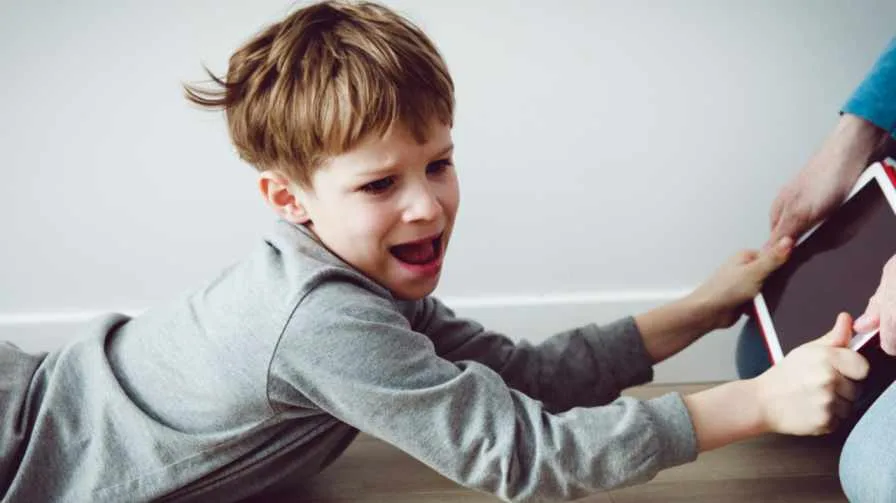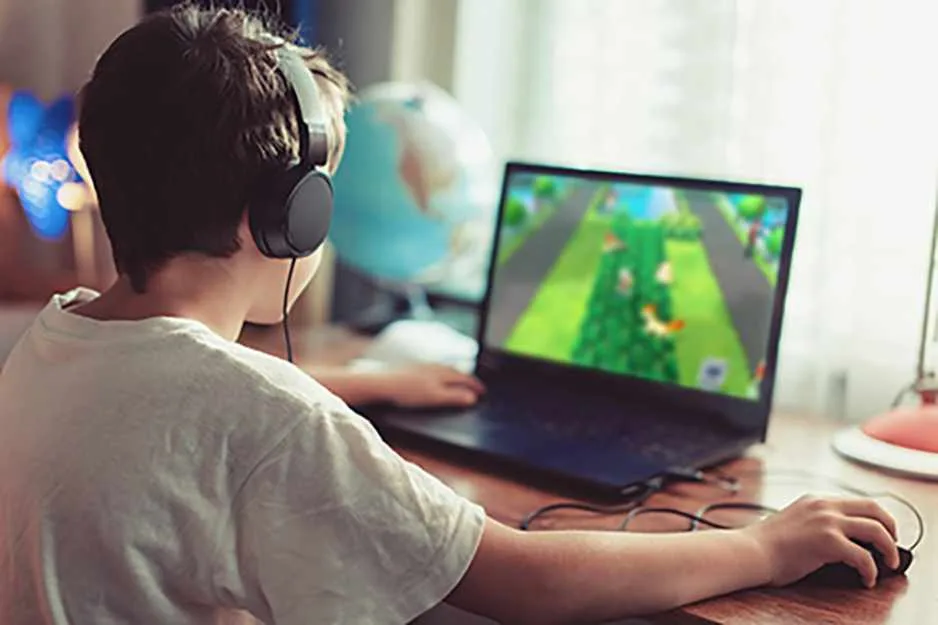Life with their 16-year-old son Alex can be tough for Stephen and Louise
Video games have captured the imagination of the world since the 1970s, with the introduction of very simple games. Although the graphical characteristics of these basic programs are primitive compared to today’s complex and multifaceted games, many children, adolescents and adults quickly became enthralled with this new hobby.
It soon became apparent that video games could potentially take up a lot time as players repeatedly tried to win.
Today, gaming addiction is recognised as an addiction to a process similar to compulsive gambling, in which the eagerness to win becomes one of the main motivations.
Alex’s compulsive desire to play first-person shooters like Counter-Strike late at night has caused years of anguish for the family. He has also just been diagnosed with autism.
He has been a patient at the NHS Specialty Clinic for the Treatment of Video Game Addiction since the start of the year.
The National Centre for Gaming Disorders is the only such addiction centre in the UK.
His parents referred him to the clinic themselves, but he did not engage in treatment. Louise believes that even though the treatment did not work for her son, there was an unexpected benefit for the rest of the family.
“What is most helpful for us is talking to other parents whose children have the same play needs. Our support group meets once a fortnight on Zoom.”
Husband Stephen said, “More than anything else, I think the greatest thing is to realise that you’re not alone. There are loads of other people up and down the country, and all across the world, that are going through the same situation”
“For us as a couple, as a family, it’s been challenging in as much as it’s quite difficult to have interaction outside the house.”
The patients compulsion to game (mainly adolescents) is so extreme that it often leads to outbursts of violence and confrontations with parents or caregivers.
If access to game consoles or computers is denied, many people treated at the clinic have threatened to kill themselves. Their social interactions are almost always limited to online or gaming activities.
Gaming disorder is a controversial medical condition that is defined by the World Health Organisation.
According to ICD-11, people with a gaming disorder have difficulty controlling the amount of time they spend playing digital games or video games. They also prioritise gaming over other activities and experience negative effects from their gaming behaviours.
Gaming disorder shares similarities with internet gaming disorder (IGD), which is a condition that the American Psychiatric Association (APA) have labelled in their Diagnostic and Statistical Manual of Mental Disorders (DSM-5) as requiring further study
Three characteristics labelled by the World Health Organisation:
- impaired control when gaming
- prioritising gaming over other interests
- escalation of gaming despite negative consequences
Some psychologists, along with the game industry itself, have questioned the evidence used to define the disorder. Until recently, in the UK, you could only seek help with problematic games through private healthcare.
The clinic – based in West London – is part of the National Centre for Behavioural Addiction. It is well established in treating gambling problems
According to consultant clinical psychologist Dr. Rebecca Lockwood, gaming is a new area for staff.
Dr. Rebecca Lockwood, PhD, Clinical Psychologist provides Psychological Testing and Individual therapy for children, adolescents, and adults.
“We know that gaming disorder is quite a rare condition. The symptoms can be really quite severe, which has surprised us,” she says.
“Often people are really struggling in managing their emotions. They can struggle with anger, anxiety and low mood. They also experience physical symptoms in terms of loss of sleep. That’s because people will be playing at night to connect with gamers abroad.”


Becky Harris is the clinic’s manager and family therapist. She says she has treated over 300 people – with 200 of those referrals occurring in 2021. She says that 89% of the people treated at the gaming disorder centre are male, but there is a surprising age range.
“No question that lockdown has impacted on young people susceptible to Gaming Disorder-we hear this from parents as well as children in our clinic ”
“We start treatment at 13. We’ve had a few 12-year-olds who’ve been referred, we’ve also heard from parents of people as young as eight, but we haven’t been able to see them. The age of people being referred goes right up to the 60s.”
It is the only NHS clinic in the UK to treat the condition and its patients are scattered throughout England and Wales and are often treated via video chat.
Dr. Lockwood says video therapy sessions have several benefits: “It allows us to interact with people who may be reluctant to come to the clinic because their motivation to participate and receive treatment can be quite low.”
For millions of people, video games are a mainstream pastime, a source of entertainment and connection. So, when does the amount of time spent playing cross the line into problematic behaviour?
Evidence collected by Ofcom suggests that 62% of adults in the UK played video games during the pandemic. And a recent study by the Internet Institute at Oxford University concluded that playing video games is actually good for the well-being of gamers. Prof. Andrew Przybylski, the institute’s research director, believes that games themselves might not be the problem.
“As far as I can tell, there’s no quantitative scientific evidence that there’s anything special about games that causes any form of psychological harm.”
“If you have somebody who is suffering and gaming is part of that, I have to say that, like any passion, it’s part of what a client is presenting as their life and their perspective and their experience.”
At the National Centre for Gaming Disorders, Becky Harris is quick to point out that the clinic is not anti-games
“We completely accept that for a lot of people, gaming is a really positive thing in their life. We are really talking about that small percentage of people who are having a massive problem with it, and it’s genuinely affecting their quality of life and their ability to interact, and their ability to function.”
When Gaming Becomes An Addiction
Not all researchers agree that video games are a harmful or addicting activity. Many people, including parents, believe that video games expand the imagination, allow children to collaborate, and sharpen cognitive skills. However, when young people spend most of their time playing video games at the expense of schoolwork, physical exercise, family celebrations, or social activities, the benefits of gaming seem less certain.
There is some controversy over whether gaming addiction is comparable to gambling, drug abuse, or alcoholism.
The source of the addictive quality of games is still unknown, but researchers propose that the process of playing and winning these games can trigger the release of dopamine, a brain chemical that elevates mood and provides a surge of energy. Dopamine is the same neurotransmitter involved in other addictive activities, such as alcohol or drugs.
Gaming addiction is currently not recognised as an addiction disorder in the Diagnostic and Statistical Manual of Mental Disorders, the definitive guide to psychiatric disorders. But obsessing about gaming at the expense of real life activities or commitments shares some of the characteristics of addictive behaviour.
How can parents tell that gaming is no longer a simple entertainment and is becoming an addiction? Here are some of the main warning signs to look out for:
- Poor performance at school, work, or household responsibilities as a result of a preoccupation with gaming
- Neglect of other hobbies or friendships
- A decline in personal hygiene or grooming
- Inability to set limits on how much time is spent gaming
- Signs of irritability, anxiety, or anger when forced to stop gaming, even for brief periods of time
- The need to spend more time playing games or to play more intensely in order to get the same level of enjoyment
- Symptoms of physical or psychological withdrawal, such as loss of appetite, sleeplessness, agitation, or emotional outbursts if the game is taken away
- Using video games as a way to escape stressful situations at work or school, or conflicts at home
A former patient of the clinic, Mike, realised that he was addicted to video games when he was in his 20s.
He played World of Warcraft up to 14 hours a day. This greatly affected his relationship with his family and made it difficult for him to study. He underwent eight weeks of therapy that gave him a new perspective on play and his life.
“I stopped playing video games as much. So, my relationship with my wife has been better. My relationship with my parents has improved. I’ve made steps towards fixing all the problems, but it was just this last push that I needed that got me on the right path.”
It’s stories like Mike’s that give Stephen and Louise the hope that their own son will one day solve some of his problems.
“I feel optimistic because on Facebook, I follow a lot of people who are very like our son, but they’re adults now. And I follow them because they’re hugely insightful,” said Louise.







